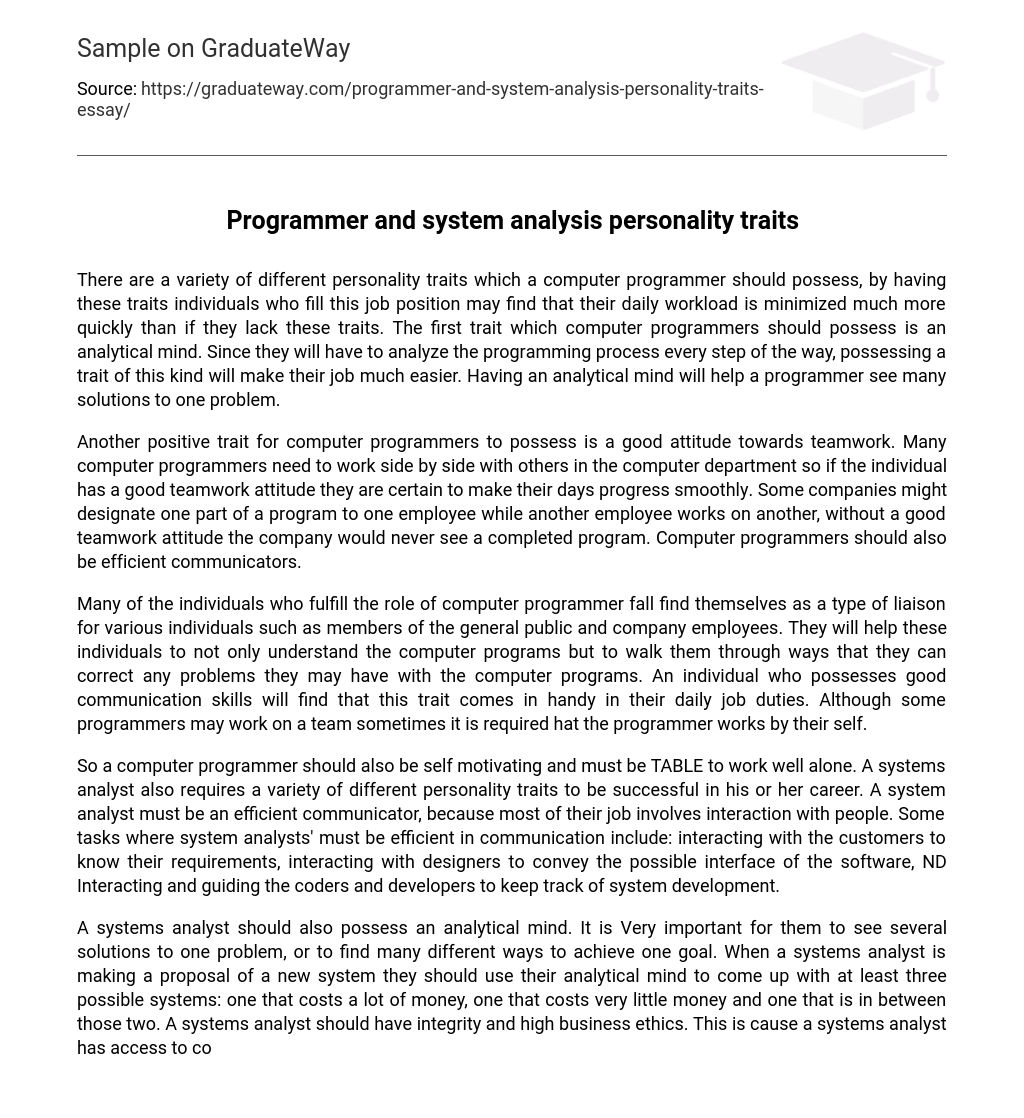To succeed as a computer programmer, it is essential to possess a variety of personality traits. These traits enable individuals to enhance their productivity in daily tasks. The most important trait for a programmer is having an analytical mind. This trait proves advantageous as programmers must thoroughly analyze the programming process and contemplate various solutions for any given problem.
Having a positive attitude towards teamwork is an important trait for computer programmers. Since many programmers collaborate with others in the computer department, having a good teamwork attitude ensures smooth progress. In some cases, companies assign different parts of a program to different employees, and without a positive teamwork attitude, completing the program would be impossible. Additionally, computer programmers should be effective communicators.
Computer programmers often serve as a liaison between different groups of people, including the general public and company employees. They assist individuals in understanding computer programs and guide them in troubleshooting any issues they encounter with these programs. Effective communication skills are crucial for programmers in their daily tasks. While some programmers work on teams, there are instances where they must work independently.
So a computer programmer must also possess self-motivation and the ability to work effectively independently. Similarly, a systems analyst encompasses various personality traits to thrive in their career. Effective communication is a vital skill for a systems analyst, as their job primarily entails interacting with individuals. Tasks necessitating proficient communication skills for systems analysts include understanding the customers’ requirements, conveying potential software interfaces to designers, and guiding coders and developers in system development.
A systems analyst must have an analytical mindset, which is vital for envisioning multiple problem-solving options or different approaches to accomplishing a goal. When suggesting a new system, it is imperative for the analyst to employ their analytical abilities in order to generate three potential systems: one that incurs high costs, one with low costs, and one that falls in-between. Moreover, a systems analyst should possess integrity and uphold ethical business practices due to their access to confidential information like salary data, planned projects, and security systems within an organization.
Keeping companies’ confidential information safe and secure is a crucial responsibility for analysts. Additionally, it is beneficial for analysts to possess the conscientiousness traits, such as being organized and thorough. Being organized enables the analyst to easily locate items and increases work efficiency. On the other hand, being thorough ensures that tasks are completed promptly and accurately. Furthermore, a systems analyst should also have a fondness for traveling.
Part of the responsibilities of a systems analyst may involve traveling to client sites to understand their requirements. However, this can be a disadvantage for individuals with a fear of flying who aspire to become systems analysts. It is important to note that computer programmers and systems analysts share similar personality traits. Both roles require analytical thinking and the ability to generate multiple solutions for problem-solving or goal attainment. Effective communication skills are also essential for both computer programmers and systems analysts.
Programmers and system analysts have distinct communication responsibilities. Programmers engage in dialogue with managers or users regarding the functionality and usage of their program, while system analysts primarily communicate with users to gather information about the desired outcomes of the system. Both roles necessitate self-motivation and independence in project work. However, there are noticeable disparities between these positions. System analysts often travel for their job, whereas programmers typically work at their computer in a cubicle throughout the day.
The passage emphasizes the contrast between a system analyst and a computer programmer regarding their treatment of confidential information. The job of a system analyst demands ethics and integrity as they handle highly sensitive data, whereas computer programmers deal with less confidential information, reducing the risk of violating company policy. Moreover, while computer programmers may or may not cooperate in coding tasks, system analysts are less inclined to collaborate in system development. It is worth mentioning that both professions require various other personality traits, but the mentioned qualities offer a general comprehension of each role.
Both careers, programming and systems analysis, share many similarities. Consequently, certain companies may promote a talented and experienced programmer to the position of a systems analyst, noting their possession of these personality traits. Thus, computer science majors possessing these traits would greatly benefit from either of these professions.





